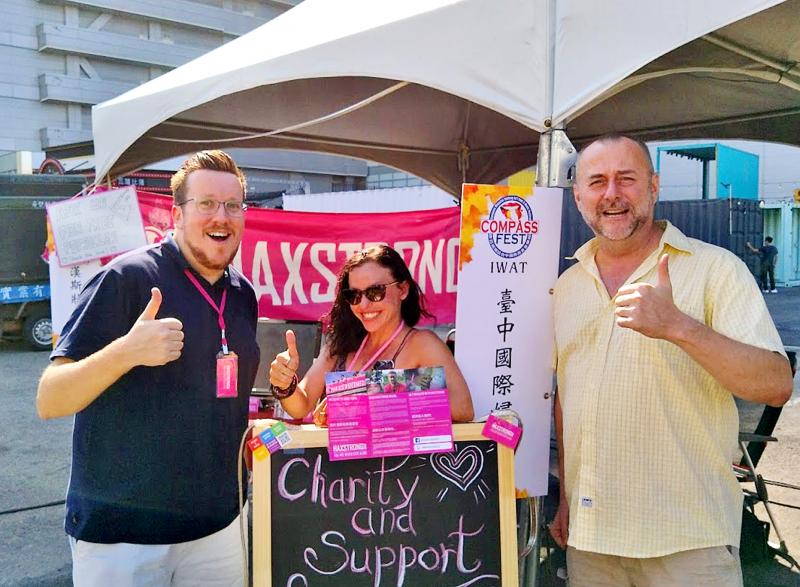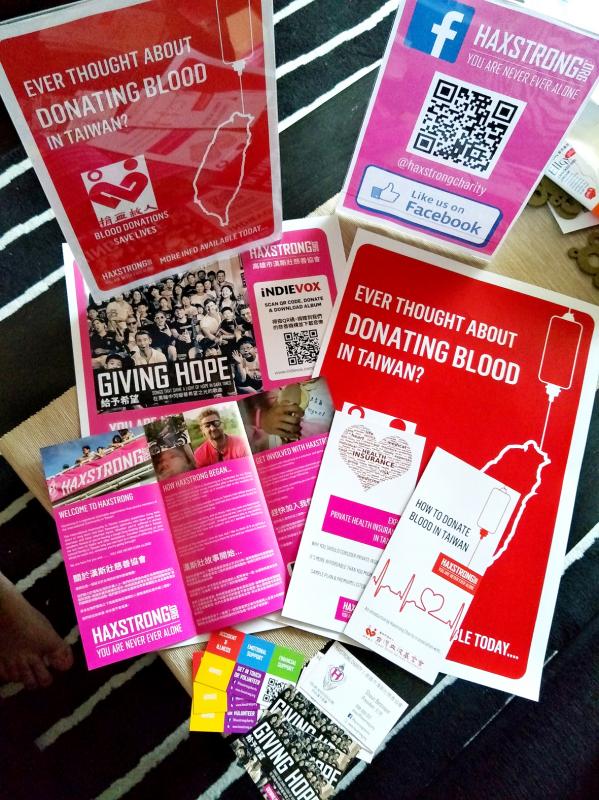Despite the country’s much-lauded National Health Insurance (NHI) and a raft of social-service programs, Taiwan still lacks a comprehensive welfare system. Citizens unable to take care of themselves are often forced to seek help from their relatives.
For a foreign resident whose family might be on a different continent, this can be a huge problem, says John Groot, Taipei representative of Haxtrong.
Registered as a not-for-profit organization in 2014, Haxstrong initially emerged in Kaohsiung in 2010 as an ad hoc group of expatriates and their Taiwanese friends who rallied to support Gregg Haxton.

Photo courtesy of Haxstrong
An English teacher from South Africa, Haxton had been grievously injured in a motorcycle accident.
“He isn’t the founder, but he is the reason the entire thing exists,” says Shaun Bettinson, Haxstrong’s Taichung-based president.
Following the accident, Haxton spent two months in a coma, then a year convalescing at his parents’ home. When he returned to Kaohsiung, he was determined to keep the support line open to others, “in an effort to thank and pay back all those who’d helped him in his time of need,” according to the organization’s Web site, haxstrong.org.

Photo courtesy of Haxstrong
Haxton currently serves as the organization’s vice president.
The Web site lists types of assistance Haxstrong can offer, as well as certain situations in which it won’t get involved.
SUPPORT NETWORK
Those suffering from anxiety, depression or suicidal thoughts will find a sympathetic ear. But there are some situations that are beyond their capacity.
The Web site makes it clear that “Haxstrong cannot help” those hoping to borrow or raise money to pay for damage to property or vehicles as a result of an accident, or who want someone to bail them out of jail. The organization can’t give legal advice, although they do sometimes suggest people contact the Legal Aid Foundation, says Groot, adding that he devotes about six hours per week to Haxstrong, though sometimes he’s much busier.
“In the situations we typically deal with — such as serious illness — a local person could depend on their relatives. Most of the Westerners we help don’t have that kind of support network. The lack of family nearby is the single greatest indicator of needing Haxstrong,” he says.
Another issue, Groot says, is that there are certain government programs that non-citizens don’t qualify for, or which give priority to Taiwanese. Care in state-owned hospices is an example of the latter.
Haxstrong doesn’t channel donations to those in need, nor does it give or loan money to expats in distress.
“We encourage people who need money to borrow it from their relatives or friends,” Groot says.
Where this isn’t possible, crowdfunding is sometimes the answer. The Haxstrong team has guided several crowdfunding efforts that raised money to pay for medication or surgery not covered by the NHI.
Because of these gaps in the NHI, Groot urges all foreign residents to sign up for additional health insurance. He says that anyone unsure how to do this can contact Haxstrong.
In about one third of the cases Haxstrong handles, Groot says, the person who contacts the organization is the one in a tight spot. In most other cases, a friend of the troubled individual approaches Haxstrong.
The people Haxstrong tries to help “are often under multiple forms of stress,” he says.
Very often, sympathy and constructive advice is enough to set them on the right course. However, individuals who need professional counseling are referred to the Community Services Center (CSC), a Taipei-based non-profit organization that works with licensed English-speaking professional counselors.
“CSC is an excellent organization which can arrange psychiatric and psychological counseling, family counseling and other help to expats,” Groot says.
Groot is reluctant to discuss specific individuals, to protect the privacy of people Haxstrong has helped, but he profiles the typical case as “an English teacher who came to Taiwan and did well, maybe for many years. But then, in his fifties or sixties, he runs into health problems. Then he can’t work, and then he’s struggling to pay his bills.”
A few people have atrocious luck. Others bear some responsibility for the bad state they find themselves in, Groot says.
“They’ve messed up. They made bad choices. We could say, ‘They brought it on themselves.’ But should we let them suffer? They’re in their darkest hour, and Haxstrong is here for them. That’s the niche we’re trying to fill,” he says.
“We don’t help anyone without doing some vetting. We do due diligence, to make sure the guy is really in distress,” says Groot, a Canadian who’s lived in Taiwan for close to 20 years.
He says that, to the best of his knowledge, the organization has never been approached by a person whose intentions were fraudulent.
Haxstrong often introduces those in need to people who can explain how they came through similar predicaments. Sometimes specialist assistance is arranged, such as a medical translator who can help a patient or his/her relatives can make better-informed treatment decisions.
‘SUSAN’S’ STORY
Earlier this year, Haxstrong volunteer Lisa Qiu (邱梨怡) used her insurance expertise — she sells life, health and other policies for a living — to help the family of Susan (not her real name), a 33-year-old American woman who last year slipped into a coma soon after beginning a teaching job in Taipei.
Susan’s mother flew over and, after completing 14 days of COVID-19 quarantine, struggled to care for her daughter, who’d emerged from the coma. She’d brought her life savings — US$15,000 — but couldn’t speak any Chinese. Apart from occasional assistance given by good Samaritans, she received no help.
After almost a year had passed, Susan’s mother was introduced to Bettinson. Because her school had said they’d taken out group insurance which allowed for a NT$1 million lump-sum payout in the event of total disability, he brought in Qiu.
“The school’s insurance agent hadn’t been very proactive about processing a claim, possibly because of communication issues,” Qiu says. “While Shaun was helping raise money for the daughter’s medical evacuation, I helped the mom file a claim,” she says.
The money was disbursed, but it took a further two months to schedule the evacuation.
Haxstrong is run by Western expats, and focuses on assisting Western expats. However, the majority of non-citizens in Taiwan are from elsewhere in Asia, and they also sometimes encounter severe difficulties.
“We don’t have any real window into the world of Southeast Asians working here, and we certainly don’t have the legal resources to get involved in employment disputes or arguments with labor brokers,” Groot says.
Asked about Haxstrong’s focus on relatively privileged citizens of Western countries, rather than Southeast Asians working and living in Taiwan, Groot says: “We are always looking at new ways we can help people, despite our organizational limitations. The bottom line is that if anyone comes to us looking for help, we’ll do what we can to connect them to the help they need.”
“We’re not a powerful organization, but we’re a team with goodwill and experience,” he says.

Towering high above Taiwan’s capital city at 508 meters, Taipei 101 dominates the skyline. The earthquake-proof skyscraper of steel and glass has captured the imagination of professional rock climber Alex Honnold for more than a decade. Tomorrow morning, he will climb it in his signature free solo style — without ropes or protective equipment. And Netflix will broadcast it — live. The event’s announcement has drawn both excitement and trepidation, as well as some concerns over the ethical implications of attempting such a high-risk endeavor on live broadcast. Many have questioned Honnold’s desire to continues his free-solo climbs now that he’s a

As Taiwan’s second most populous city, Taichung looms large in the electoral map. Taiwanese political commentators describe it — along with neighboring Changhua County — as Taiwan’s “swing states” (搖擺州), which is a curious direct borrowing from American election terminology. In the early post-Martial Law era, Taichung was referred to as a “desert of democracy” because while the Democratic Progressive Party (DPP) was winning elections in the north and south, Taichung remained staunchly loyal to the Chinese Nationalist Party (KMT). That changed over time, but in both Changhua and Taichung, the DPP still suffers from a “one-term curse,” with the

Lines between cop and criminal get murky in Joe Carnahan’s The Rip, a crime thriller set across one foggy Miami night, starring Matt Damon and Ben Affleck. Damon and Affleck, of course, are so closely associated with Boston — most recently they produced the 2024 heist movie The Instigators there — that a detour to South Florida puts them, a little awkwardly, in an entirely different movie landscape. This is Miami Vice territory or Elmore Leonard Land, not Southie or The Town. In The Rip, they play Miami narcotics officers who come upon a cartel stash house that Lt. Dane Dumars (Damon)

Today Taiwanese accept as legitimate government control of many aspects of land use. That legitimacy hides in plain sight the way the system of authoritarian land grabs that favored big firms in the developmentalist era has given way to a government land grab system that favors big developers in the modern democratic era. Articles 142 and 143 of the Republic of China (ROC) Constitution form the basis of that control. They incorporate the thinking of Sun Yat-sen (孫逸仙) in considering the problems of land in China. Article 143 states: “All land within the territory of the Republic of China shall